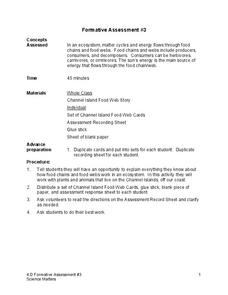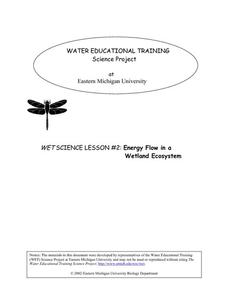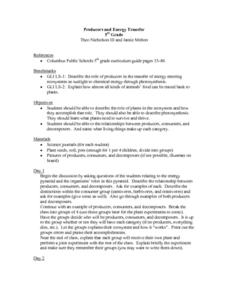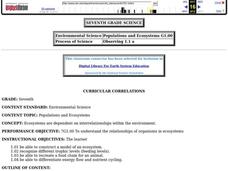Curated OER
Flow of Energy Through An Ecosystem
In this flow of energy in an ecosystem, students complete a graphic organizer and show the flow of energy from the sun to producers, primary consumers, secondary consumers, tertiary consumers and then decomposers. Students define each of...
Curated OER
Eco-Detectives
Students explore natural decomposers. For this decomposing lesson, students participate in a WebQuest to discover how nature handles decomposition. Students compare natural methods for decomposition with recycling efforts.
Curated OER
Dissolved Oxygen in an Aquatic Ecosystem
Students explain why dissolved oxygen is important in aquatic ecosystems. They evaluate the optimal dissolved oxygen levels for living organisms.
Teach Engineering
Dirty Decomposers
Do not let the class just sit and rot. Pupils learn how decomposition and nutrient recycling is important to an ecosystem. Groups design an experiment to determine how environmental conditions affect decomposition. They develop a poster...
Curated OER
Regents High School Examination: Living Environment 2005
The 2005 version of the Regents High School Examination in the area of ecology is as comprehensive as previous years' exams. It consists of 40 multiple choice questions on everything from the structure of DNA to the interactions within...
Exploring Nature Educational Resources
Building A Classroom Food Web
From bears and owls to chipmunks and trees, all life depends on the sun for the energy to survive. Young biologists develop an understanding of this big idea as they arrange this series of plant and animal picture cards into food...
Curated OER
Cut and Paste Food Chain
Young scholars study life science. For this food chain lesson, students discover the different types of animals that make up an ecosystem. They discuss as a class and then work independently on a food chain activity. This lesson includes...
Science Matters
Mighty Microorganisms
How can you tell if a microorganism is helpful or detrimental to an ecosystem? Learners inspect slides or pictures of microorganisms and record their observations to...
Science Matters
Formative Assessment #3
Thirteen short-answer questions follow a brief food web activity in a formative assessment designed to test knowledge of ecosystems and the energy that flows through them.
Eastern Michigan University
Energy Flow in a Wetland Ecosystem
How is energy transferred within an ecosystem? What would happen to a food web if one of the organisms was removed? Elementary or middle school ecologists examine these questions and more in a comprehensive 5E learning cycle lesson....
Science Matters
Matter Cycles — Sum It Up
Scholars become part of the cycle of matter with a reader's theater that showcases producers, consumers, decomposers, and the sun. A diagram and discussion concludes the learning experience and enhances comprehension.
Curated OER
Dirty Decomposers
Students explore the ecosystem by conducting a ziploc bag experiment. In this recycling instructional activity, students identify decomposer organisms in our environment and how they speed up the recycling process. Students utilize a...
Curated OER
Forest Ecosystem
Students become familiar with the temperate rainforest. In this forest ecosystem lesson, students identify the producers, consumers and decomposers in the forest ecosystem. Students sort cards and identify the trophic level...
Curated OER
Producers and Energy Transfer
Fifth graders discuss the relationship between producers, consumers, and decomposers as they look at the energy pyramid. While working in small groups, they create an ecosystem that includes all or some of the given categories, and they...
Curated OER
The Mechanisms of Decay and Decomposition
Eighth graders study how all living things die. They are introduced tot he life cycle and the concept of an ecosystem. Students have a introductory exposure to trophic levels (producer-consumer-decomposer) in the environment.
Curated OER
Populations and Ecosystems
Seventh graders create a model of an ecosystem and label it to show structure and function. They research the food web of an aquatic animal and also trace energy flow from the primary producer up the food chain.
Curated OER
Nutritional Relationships Chart
Producers, Herbivores, Carnivores, Decomposers, oh my! Help organize the intricacies between these four types of eaters with this biology worksheet. Scientists display nutritional relationships in a graphic organizer. They place 15 terms...
Alliance Theater
The Jungle Book Post-Show STEAM Lesson
An ecosystem is really just the flow of energy through many different living organisms. A study of Rudyard Kipling's The Jungle Book leads to an environmental science activity in which learners study how various factors can affect...
National Park Service
Living & Non-Living Interactions
What better way to learn about ecosystems than by getting outside and observing them first hand? Accompanying a field trip to a local park or outdoor space, this series of collaborative activities engages children in...
Curated OER
Decomposers- Nurse Logs
Young scholars investigate temperate forest ecosystems. In this environmental lesson, students discover different forms of decomposition and its effect on the environment.
Curated OER
Ecosystems - Lessons 1 and 3
In this biology learning exercise, learners answer 22 multiple choice questions on ecosystem. They identify which ecosystem component is described in each of the question.
Curated OER
Exploring Ecosystems
Fourth graders investigate ecosystems. In this ecosystem lesson, 4th graders explore producers, consumers, and decomposers and study the interdependence of each.
Curated OER
Energy Flow in Ecosystems
Young scholars, in groups, create a slide show about the ecosystem and answer critical thinking questions based on their research.
Curated OER
What Are Ecosystems?
Third graders recognize and examine ecosystems. They observe and describe habitats within ecosystems and observe and identify organisms with similar needs that compete for resources.

























